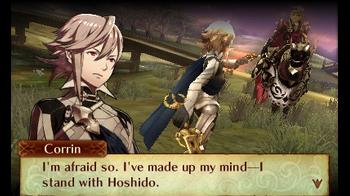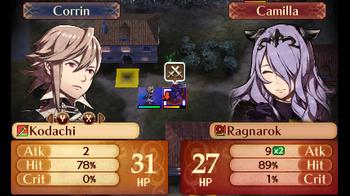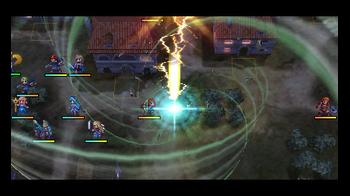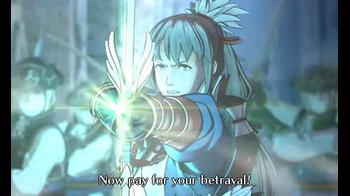
Fire Emblem Fates: Birthright Review
How about that Fire Emblem: Awakening, then? Originally intended to potentially be the final entry in the storied strategy RPG series, perhaps making something that felt so final allowed the developers to tap into something special. The game found a balance and a groove that allowed it to find unprecedented success not just in Japan but also in the West, a territory the series never fully found a foothold in.
Such a strong surge made a sequel a necessity, and so here we are with what is essentially three, all under the banner of Fire Emblem Fates. There's Birthright, Conquest and Revelations - and while the obvious comparison to draw here is Pokemon, there's a lot more different between these three releases than with those games, with each game featuring a unique storyline and many exclusive character units.
You can find the reviews of Conquest and Revelations through those links, but be advised that this is what you really need to know: Conquest is designed for Fire Emblem veterans, and offers a harder and less forgiving experience than Birthright. Revelations is the ultimate culmination of both versions for a narrative finale.
Birthright, the subject of this review, is a more accessible and user-friendly take on the Fire Emblem formula - the gateway drug, if you will. The initial setup is similar to Awakening. You create your character from various pre-set pieces and are then thrown into a prologue. You've lived in the land of Nohr for as long as you can remember, but through the course of the prologue, which is identical across the releases, you learn that as a child you were kidnapped from another country, Hoshido, and are urged to return.
This is where the Fire Emblem Fates universe splits: the player can return to their original homeland, Hoshido, or stick with Nohr, who actually raised you. Going one way will in some sense leave the other hostile, and with this being a Fire Emblem game there's of course going to be conflict. Birthright tells the tale of you returning to Hoshido, and a pretty typically melodramatic anime-style plot ensures where Corrin - the default name for your hero, but you can name them whatever you fancy - turns his back on and ends up fighting many of those who raised him in order to return to the land of his or her birth.
The core gameplay of the Fire Emblem series is shared between all three of the titles. They're tactical RPGs with battlefields divided into chess-style squares. Every move you make is important, and it's vital to try to line up your characters in a way that's most likely to give you decent coverage of the battlefield and not leave weaker but vital support units without the cover they so sorely often need.
The 3DS seems absolutely perfect for this series, and a new game reaffirms my belief that the machine itself helped these games find huge success with Awakening. It just compliments Fire Emblem well. Grid-based movement means you don't need anything but a D-Pad, while the bottom screen is home to everything you need to know - character information, attack success predictions, the works. That leaves the top screen clear for a more absolute battlefield view. It's just smart. Pretty much all the features from that game are present, from multiplayer to various single-player nuances. All these elements worked well in Awakening, and they continue to do so in this sequel.
There's a solid range in the enemies you'll battle, and the core of the battle system is a basic strengths-and-weaknesses game that RPG fans should be most familiar with. This is an iterative follow-up to Awakening on every level - not necessarily a bad thing. Sometimes this slavish devotion to beloved features from Awakening can mildly backfire, though.
Awakening had a time-bending plot that saw characters able to have children that would then fall through a plot-explained hole in time back into the past to join their parents' army and fight alongside them before they were even conceived. Fates returns this mechanic, but the way it's explained isn't nearly as ingrained into the title's narrative - it feels like it's there because it was so popular in Awakening. It is nice to foster relationships with characters and then see their offspring, yes, but without the critical story significance this holds in Awakening it's much less-so here.
One mechanic that hasn't been dented this time around is the ever-compelling fact that almost all your units are fleshed-out characters in the story, while optional scenes outside of combat will see characters who level up their affinity for each other by assisting each other in battle help endear them to you further. In a sense this mechanic adds a satisfying extra layer to combat in that I began positioning units not only for combat utility but also to pair together those I wanted to grow closer to each other - suddenly, strangely, it becomes a bit of a dating sim, and the much-publicised removal of some mini-games around this mechanic, for better or worse, didn't seem to lessen its impact.
While Birthright is the easiest and most approachable of the three, it still retains an option for permanent death, something I consider absolutely core to the Fire Emblem experience. When you begin to like these characters through the aforementioned story beats, which are well-written if littered with the expected anime stereotypes, losing them becomes a big deal and lends a real weight and tension to combat scenarios - or it should. Sadly, this is also where Birthright loses me a bit.
In attempting to be the most accessible entry in the series, Birthright turns Fire Emblem a bit soft. Even on the highest difficulty there are some super-units the game drops into your lap that absolutely wreck everything, and one thing that becomes clear after playing the other two entries is that this is a problem that's fairly exclusive to the watered-down Birthright. The game's challenge can be upped by simply not using those units, but that's not exactly an ideal solution. Similarly, the game's 'scouting' missions offer practically unlimited scope for grinding, which in turn can make combat even more trivial in no time. These are nice features if you're not comfortable with the tactics-driven strategy RPG gameplay - you can brute force with sheer strength - but in my eyes also aren't what Fire Emblem ore the genre is really about.
Birthright strips back in other ways that seem smart for newcomers to the genre but ultimately leave me a little cold. There are less mission objectives in this release, so while the other two games feature a lot of different objectives, Birthright sticks to having you eliminate all the enemies; it keeps things simple. Beneath all this remains one of the tightest and best-made strategy RPG combat loops and out-of-combat preps ever made - it's just been adjusted to fit this release's goals.
This is where the split starts to hurt Fates, at least a little. The opening of the game sees you with your family in Nohr, who appear to be a well-fleshed-out group of anime archetypes you'd be interested in knowing. Once you side with Hoshido and leave Nohr to kick off the Birthright plot line, their character development sadly evaporates and a number of them turn into moustache-twirling villains. You find yourself wondering how the main character ever managed to live with them in the first place.
Fire Emblem Fates: Birthright is by no means a bad game - the combat is excellent, the story is for the most part fun, and it features excellent presentation from its pitch-perfect dual-screen user interface down to another great musical score by a great little stable of composers.
This is a bloody good RPG, but it's one that's been significantly watered down in an attempt to bring in new players. If you're trying to draw a friend into the world of strategy RPGs, Birthright is ideal. If you're a more experienced RPG fan this might well satisfy, but another version of Fire Emblem Fates might satisfy you more - this one is just a little too simple and easy, and in line with that is a touch lacking in depth.



